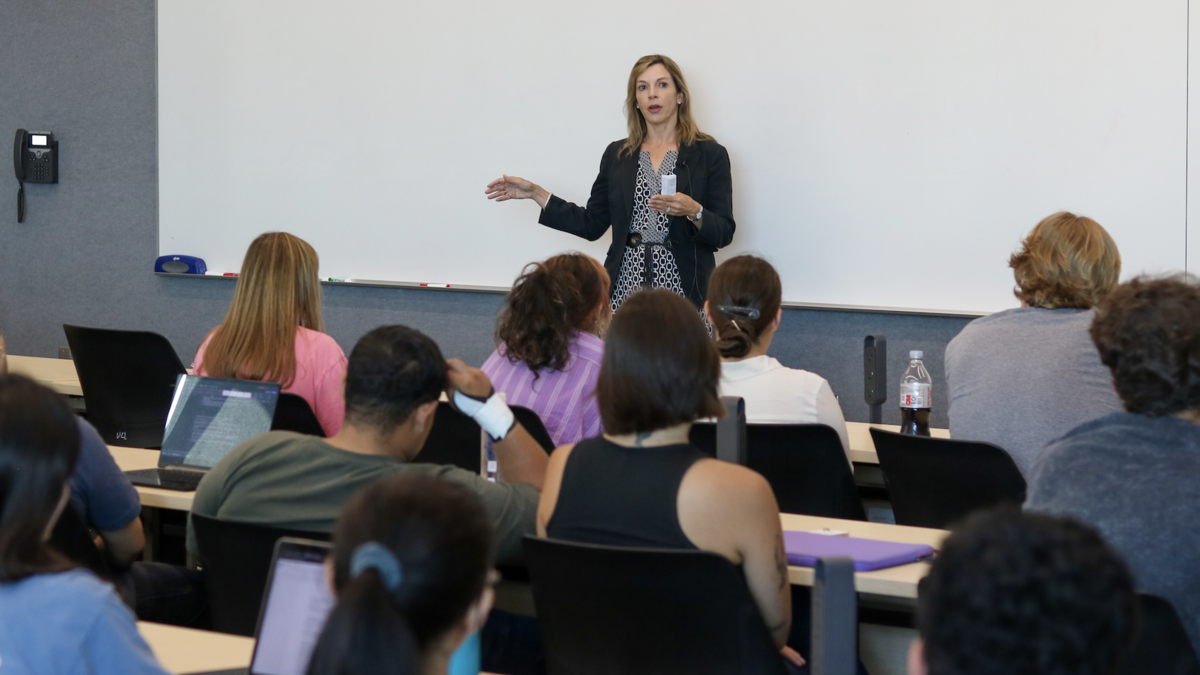McCain Institute executive director discusses character-driven leadership with ASU students

Evelyn Farkas, executive director at the McCain Institute for International Leadership, speaking at the “Leading Now” event, where she discussed the idea of what character-driven leadership means with ASU students.
Evelyn Farkas, a trailblazer for national security and foreign policy in the U.S., has spent the past three decades standing up for democracy.
“Democracy to me means freedom,” Farkas said. “The freedom to express yourself politically, the freedom to express yourself economically, and it was something that my parents didn’t have when they were born.”
Arizona State University's School of Politics and Global Studies recently hosted Farkas, executive director at the McCain Institute for International Leadership at ASU, for the event “Leading Now,” to discuss the idea of what character-driven leadership means in collaboration with running for office.
Not only did Farkas’ qualifications lead her to run to represent New York’s 17th Congressional District in the House of Representatives in 2020, but also her upbringing.
Farkas’ parents fled Hungary in 1956 while it was under the influence of the Communist system and the Soviet Union in hopes of finding the freedom to achieve. She said that even as a child, she felt strongly about being in America as opposed to anywhere else.
“That has motivated me throughout my entire life and probably also determined the fact that I would get involved in international affairs, foreign policy and work for the U.S. government,” Farkas said.
During the 2020 election cycle, Farkas was moved to get involved politically.
A month later, long-term U.S. Rep Nita Lowey announced her resignation and Farkas went headfirst into campaigning. She would ultimately earn 15.6% of the electoral vote, coming in third during the Democratic primaries.
Reflecting on her campaign, Farkas shared a few lessons that she learned with students and faculty.
Farkas revealed that running for office was unlike any other job that you interview for or try to obtain. She emphasized the importance of being organized, raising money and having someone on the campaign who has your back.
“Campaigning and politics can be really draining, and you don’t oftentimes know who’s giving you good advice, and you need someone to confide in, someone to pick you up,” Farkas said.
For the remainder of the event, Gina Woodall, principal lecturer at ASU, moderated a discussion and questions from the audience.
Woodall and Farkas discussed various topics, such as gender stereotypes or double standards during her time campaigning. According to Farkas, she had an easier time as a female candidate because of her prior experience working in male-dominated fields. She acknowledged that she was encouraged by male community leaders to run for office.
“Bottom line is if you stick to your values, you're always going to feel good, even if you’re losing,” Farkas said.
Even if her efforts ended in a congressional defeat, Farkas revealed that character-driven leadership while running for such a position was one way to stick up for democracy.
“I knew that there are many ways to contribute to society and I had already done a lot of them,” Farkas said. “I’d already had lots of jobs, so I knew, ‘Look, if I don’t win, it’s going to be okay. I’ll find some other way to defend democracy.’”
Farkas advised students that to have an attitude of being OK if one thing doesn’t work out and being motivated to do something else is a helpful way to approach life.
The floor was then opened for participants to engage in conversation with Farkas.
Students in the audience would ask Farkas questions ranging from how overturning Roe v. Wade might impact midterms to her thoughts on identity politics.
As the event came to a close, Farkas reflected on how the lessons she learned running for office helped form her experience at the McCain Institute.
“I learned to be true to myself when I was running for Congress. In campaigns, you learn about having empathy and leading by example. I think that you learn through your experiences, but you get strengthened by the good decisions you make,” she said.
More Law, journalism and politics

Law and addiction: How new science is impacting the justice system
For years, people who struggle with drug addiction have often been considered weak or in need of incarceration by the general…

Exhibit uses rare memorabilia to illustrate evolution of US presidential campaigns
After one of the most contentious elections in history, a new museum exhibit offers a historical perspective on the centuries-old…

TechTainment conference explores the crossroads of law, technology, entertainment
What protections do writers, actors, producers and others have from AI? Will changing laws around name, image and likeness (…

